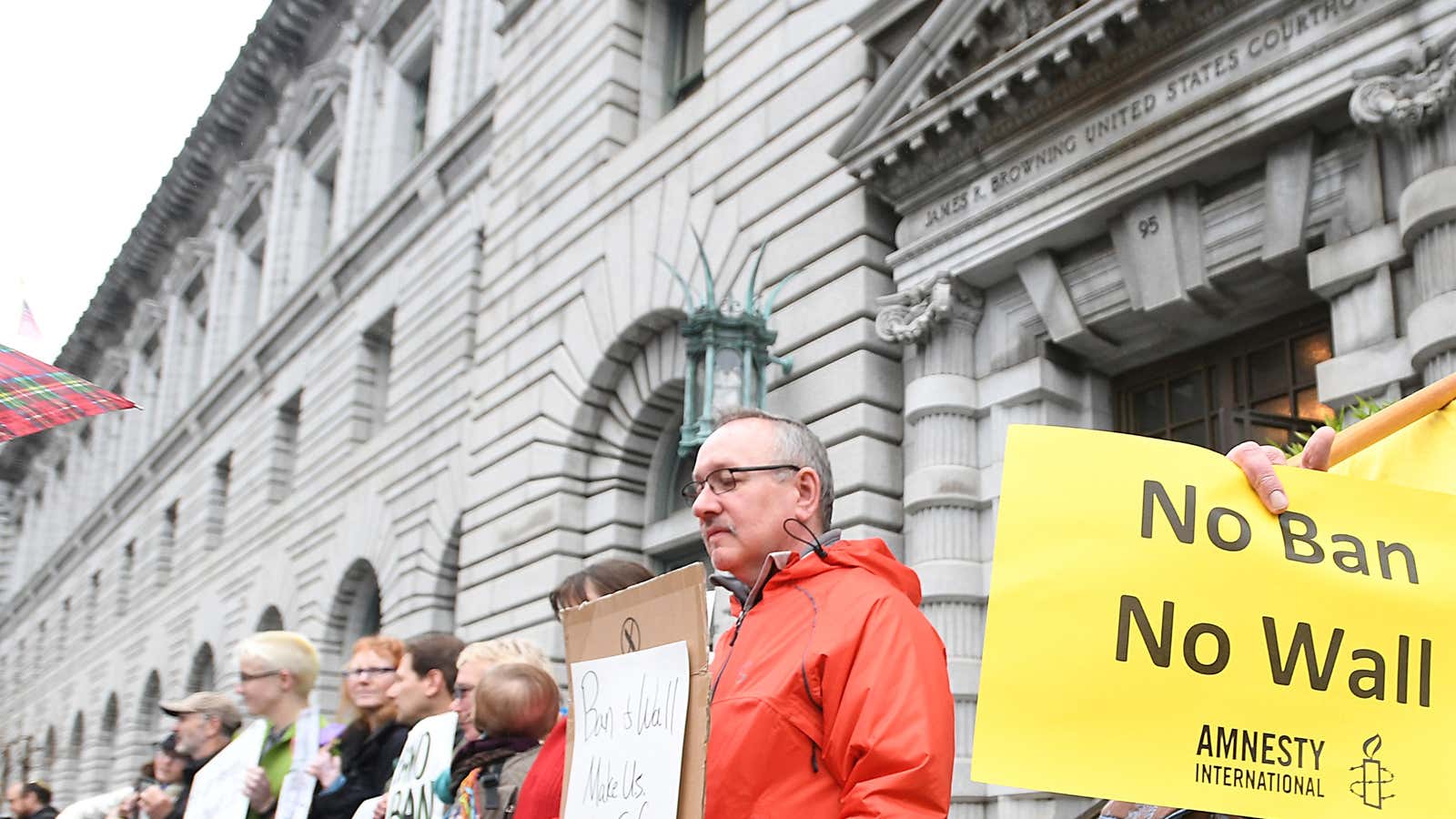Donald Trump just got a very important lesson for an American president. He may be the center of international attention, and feel like king. But no one’s got total power in the US, and that’s by design, as federal judges reminded the world last night.
In their Feb. 9 decision on State of Washington v. Trump, a three-judge panel on the 9th Circuit Court of Appeals in San Francisco denied the Trump administration’s emergency request to lift a temporary restraining order on a White House executive action calling for travel and immigration restrictions. A Seattle district court judge issued the restraint after Washington state challenged Trump’s edict on behalf of affected foreign students and scholars, arguing that it violated various constitutional protections.
The federal appellate court’s decision is 29 pages long (pdf). That’s super short for a ruling implicating the weighty issues at play here—national security, separation of powers, due process guarantees, and the right to freedom from religious discrimination. It’s not, however, a decision on the merits of the case; the court didn’t conclude whether Trump’s order is legal or violates Constitutional rights, setting aside those questions for another day.
But in unanimously deciding against relief for the federal government, the appellate judges indicated that the executive edict is flawed, and the administration’s arguments weak. Most notably, they reminded Trump that even national security concerns don’t invalidate the Constitution.
The court writes:
“The Government has taken the position that the President’s decisions about immigration policy, particularly when motivated by national security concerns, are unreviewable, even if those actions potentially contravene constitutional rights and protections. There is no precedent to support this claimed unreviewability, which runs contrary to the fundamental structure of our constitutional democracy.”
On the contrary, the decision explains, such a sweeping federal immigration policy is very much subject to review by courts:
“Although our jurisprudence has long counseled deference to the political branches on matters of immigration and national security, neither the Supreme Court nor our court has ever held that courts lack the authority to review executive action in those arenas for compliance with the Constitution.”
The notion that the political branches have unreviewable authority has already been repeatedly rejected, the judges remind:
“Indeed, federal courts routinely review the constitutionality of—and even invalidate—actions taken by the executive to promote national security, and have done so even in times of conflict.”
The four main questions considered by the judges
Then the appeals court explains why it’s denying the government’s request for emergency relief specifically. From a procedural perspective, the government isn’t automatically entitled to the stay it sought, so the judges asked four questions, based on a standard set in prior cases. The first two questions are most critical, and the last two steps are reached once the party seeking relief satisfies the first two. The answers might not be so simple, but the questions themselves were straightforward.
The question in this case was, first, did the US Department of Justice, which argued the case on behalf of the administration, make a strong showing that it’s likely to succeed in appeal on the merits? Second, if the government is denied relief from the restraining order, will it be irreparably injured? If yes to both of those questions, then, third, does granting the government relief substantially injure the other interested parties? And finally, where does the public interest lie?
The court concluded that the DOJ failed to clear the first two critical steps and that the final two factors didn’t support granting a stay.
First, on the merits, the judges said the federal government seems unlikely to succeed in beating arguments that the Trump order flouts the guarantees of due process, as it provided no notice or opportunity for a hearing, contrary to procedural protections granted by the Constitution. The decision also notes the “serious nature of the allegations” of religious discrimination raised by Washington state in its case against the federal government.
Second, the federal government wouldn’t be irreparably injured by a denial of emergency relief, the judges concluded. In other words, there would be no breakdown in process; the DOJ could keep litigating the claims in court.
On the other hand, people affected by the executive order would be substantially injured if the restraining order were lifted and the executive order reimplemented, because they couldn’t travel freely and would be separated from their families and homes, and they have an interest in freedom from religious discrimination, the judges concluded. That answered the third question.
Finally, the court weighed the public interest in the matter, finding competing concerns equally important. The decision’s final paragraph notes:
“On the one hand, the public has a powerful interest in national security and in the ability of an elected president to enact policies. And on the other, the public also has an interest in free flow of travel, in avoiding separation of families, and in freedom from discrimination… [W]hen considered alongside the hardships discussed above, these competing public interests do not justify a stay.”
The DOJ shared its response via Twitter.
President Trump tweeted, too, with a tone all his own.
